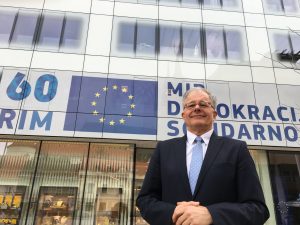A segment of the Croatian public still hasn’t completely managed to adapt to the new European dimension. Our Representation Office has been investing a lot of effort into brining the European project closer to the citizens of Croatia. Personally, I care deeply about our pupils and students being well-informed on this matter. „Personally, I care deeply about our pupils and students being well-informed about the benefits of EU membership, and I spend a good portion of my time in schools and at faculties all over Croatia talking to young people about the future of Europe because that’s what will affect them the most“, says Branko Baričević, Head of the European Commission’s Representation in Croatia, in an interview for Diplomacy&Commerce magazine.

He adds that most young people that he has talked to see the EU as a good opportunity for Croatia as a whole, but also for personal growth of Croatian citizens. What could contribute greatly to this is re-focusing on raising the social standards in the EU to the benefit of its citizens. Still, the EU should be viewed, first and foremost, as an aggregate of basic values that the EU citizens and countries share. In that context, there is no alternative to the EU – says the Head of the European Commission’s Representation in Croatia.
-
Following the speech about the state of affairs in the Union that the president of the European Commission, Jean-Claude Juncker gave in front of the European Parliament in Strasbourg, do you think that the future of the EU and Croatia in the Union is now more certain? What are the most important points from Juncker’s speec, and what situation is the Union in at the moment? Could you compare the EU today to the EU five years ago when Croatia became its member, and the EU in five years’ time?
In mid-September, president of the European Commission, Jean-Claude Juncker gave its third state of the union speech in the European Parliament which many said was his best to date because it was positive and relfected the trend of exiting the financial and economic crisis while underlining the three basic European principles – freedom, equality and the rule of law.
Mr. Juncker stressed that Europe has to be a union of equal countries, whether big or small, northern or southern, and how Europe has to breathe with both of its lungs (eastern and western) otherwise our continent would lose its breath. There are no second class citizens, workers or consumers.
You are asking me if, following this speech, the EU’s future is going to be more secure? There is no speech that can guarantee that. The future of the European Union is our hands; in the hands of its citizens and its leaders.
After a prolonged period of financial and economic crisis, the European Union and all its member states, have started to record economic growth, as well as the highest employment ever in the history of the EU – 235 million EU’s citizens are employed. This is unprecedented!
In the last three years alone, around 8 million new jobs were created partly due to and owing to the Investment Plan for Europe which is starting to yield its first results in Croatia too.
These trends also demonstrate that the European Union is strong and has mechanisms to manage crises, in addition to having political will which gives us every right to be positive about the EU’s future, including the future of Croatia, as its younger member.
-
What do yout think of the progress that the official Zagreb made towards the Schengen Zone? How much can the border conflict between Slovenia and Croatia, and official Ljubljana’s possible conditioning and stalling affect that? How much has Croatia progressed internally in terms of joining the Schengen Zone?
Today, Croatia is a step closer to joining the Schengen Zone. I would like to remind you that, on 27th June, Croatia was granted a full access to the Schengen Information System (SIS), which is a joint database used by member states that contains information about personae non gratae in the EU, persons who are wanted by the authorities, stolen vehicles and similar.
The evaluation of the implementation of the Schengen Acquis is carried out in several areas, in line with the set plan, and according to the agreement between Croatia and the EC. The next evaluation is scheduled for this month. We do hope that Croatia will meet the set criteria next year, but joining the Schengen Zone is a political decision that the European Council has to make.
In his speech, president Juncker appealed to member states to have a positive stance regarding this matter, and invited them to support Romania, Bulgaria and Croatia joining the Schengen Zone ASAP, i.e. as soon as they meet all of the set criteria.

-
How much did Croatia manage to find its place in the EU, both in terms of its influence in EU bodies, especially the EC, and internally, i.e. in utilizing EU development funds?
Following its accession to the EU, Croatia immediately joined the EU institutions, and has been actively participating in their work.
At the European Parliament election, Croatian citizens chose their representatives who are now members of various parliamentary committees. Croatia also has a commissioner in the European Commision who is in charge of international cooperation and development and who, in accordance with the authority that commissioners have, participates in making of all of the Commission’s decisions, as well as has influence on creation of new European policies despite the fact that he, actually, does not represent Croatia per se, bur rather implements European policies.
Of course, our prime minister actively participates in the European Council’s sessions, while certain line ministers also participate in ministerial meetings where key decisions for certain areas are made. Representatives of the Croatian civil society, social partners and regions are also integrated in the EU bodies. Maybe Croatian citizens are not that acquainted with the role they play, but we can definitely say that Croatia is well-integrated in all EU institutions, and that it influences all of the processes in the EU via its representatives.
I am sure that, in the future, the Republic of Croatia is going to utilize its EU membership even better.
-
The commencement of preparations and all the required activities for Croatia joining the eurozone have been announced. What is the most appealing to Croatia regarding joining the eurozone, and what could obstacles could the country encounter on that path?
To start off with, I have to say that joining the eurozone is an obligation that Croatia, just like any other member state apart from Denmark and the United Kingdom, took upon itself when it signed the accession agreement.
Joining the eurozone is a huge incentive for economy, and a great opportunity for a country like ours. Removing the exchange rate risk, as the most important obstacles for exporters and importers, is a very significant advantage especially for Croatia as a highly euroized country.
I would like to remind you that euro enabled reduction in transaction costs in product and service exchange in Europe thus allowing free flow of goods, capital and labour. Also, as a result of introduction of euro, regulatory expenses, like higher interest rates to be paid by borrowers, would be abolished.
In other words, loans would be more favourable to lenders (banking sector) and borrowers. Deepening of the economic integration, higher level of specialization, and bigger trade volume make eurozone one of the biggest economic areas in the world. The latest data collated by Eurostat shows that, in all likelihood, 2017 is going to be the best year for eurozone in terms of economic growth, with the rates higher than those in the US, and the best recorded results since the onset of the economic and financial crisis ten years ago.
The goal is for euro to become a uniform currency in the EU, which is why president Juncker suggested, in his speech, that an accession instrument for euroarea should be devised that would provide not only technical, but also financial assistance to member states, i.e. an opportunity that Croatia should seize.
-
How much do Croats believe in Europe, and how much do you personally belileve in the European project as something that doesn’t have an alternative?
The latest data from Eurobarometer show that 57% of Croatian citizens think of EU membership as a positive thing, and 64% of those surveyed also thing that EU membership was beneficial for Croatia.
However, there is still a segment of our population that has not completely adapted to the new European dimension, and still see the whole situation as „us vs Europe“. This is where our Representation Office has a great task to do, and we have been investing a lot of effort into bringing closer the European project to people all over Croatia.
We are doing this in collaboration with the Croatian governmetn and its institutions, social partners, civil society and academia.
Personally, I care deeply about our pupils and students being well-informed about the benefits of EU membership, and I spend a good portion of my time in schools and at faculties all over Croatia talking to young people about the future of Europe because that’s what will affect them the most.
Most young people that I have talked to see the EU as a good opportunity for Croatia as a whole, but also for personal growth which they are already utilizing through the Erasmus+ programme which celebrates its 30th year of implementation in Europe, and 10th in Croatia this year.
I would also like to mention the recent meeting of the top European officials in Gothenburg at which they agreed to focus more on raising social standards in the EU in the following period. They also undertook to improve the social dimension of the European Union to the benefit of all of its citizens.
But, I would like to reiterate that the EU should be viewed, first and foremost, as an aggregate of basic values that the EU citizens and countries share. In that context, there is no alternative to the EU.